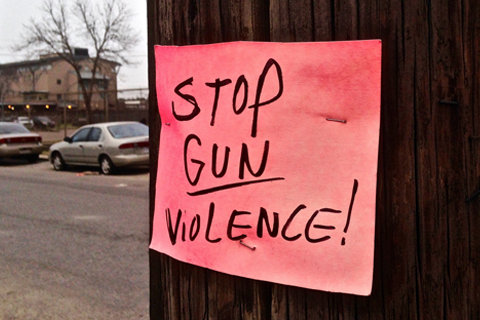Sign up to stay in the loop on new styles and sales!
Sign up to stay in the loop on new styles and sales!
On Alton Sterling and Racialized Violence
thinx archive
·5 min read

by Emma Glassman-Hughes | 07/07/2016
Image by Bart Everson
***FYI: this post is coming straight out of South Africa, where I've been for the past few weeks.***
South Africa is famous for a few things: great white sharks, rugby, notoriously tough-to-master accents, and apartheid. It's a country--one that I immediately fell in love with, by the way--that has lived through a very bloody (and not in the menstrual way) history of colonial control, brainwashing, and disenfranchisement, all of which came to a head with the implementation of apartheid in the mid-20th century. People of color were forcibly relocated from cities to townships and shack settlements far outside city-centers; people had to produce passes to access certain parts of cities--every aspect of daily public life was engineered to maintain racial separation. This legalized race-based segregation was only just formally abolished in 1994, ushering in what was supposed to be a new era of post-racial harmony--the era of the “rainbow nation”--despite there being pitifully few structural changes actually made. Black people and people of color (so-called “Coloured” people) have seen practically no change in treatment or access to comfortable South African life in the 20+ years since the end of apartheid.
From a cushy seat in a U.S. classroom, it is easy to look at South Africa’s history of brutal and public oppression and decide that it is problematic. It is easy to decide that South Africa has a race problem. When you learn about the history of nonviolent protests met with extreme police force--like in Soweto in 1976 when hundreds of black school children died simply trying to receive the education they deserved; or in Marikana in 2012 when dozens of impoverished, black miners were shot in the head and the back because they demanded to be paid a living wage--it is easy to decide that South Africa has a race problem. They're still working on it, their wounds are fresh. “This seems like a you problem,” etc. etc.
Us, on the other hand--well that's an entirely different story. We had the Civil Rights movement a whopping 50+ years ago. We fixed things long before they did, and we came out on top. Sure, we also institutionalized race-based hatred and discrimination, but that was a long time ago; we've healed now. We're all equal now.
Woof. If I continue on like that I might just suffocate myself with all this sarcasm.
My point is that South Africa is known internationally for instituting racism, while the U.S. is known internationally for its love of fast food. Our history of racism and exclusion is just a footnote on our otherwise impressive international resume, while South Africa’s colors virtually any outsider’s understanding of South African affairs. How did we pull that off?? This sounds like the scam of the century.
Sigh. Shifting gears for a sec.
Alton Sterling was a father of three children from Baton-Rouge, Louisiana. He and his family lived a modest life; it was difficult for them to pay the bills and keep up with family expenses. To survive, he sold CDs on the street. Sounds like a real moneymaker. *rolls eyes*
He wasn't a perfect, or even a great man. He was a registered sex offender from 2000 when he was charged of carnal knowledge with a juvenile. You'll probably read all about this aspect of his life in other publications, so I won't dwell. The point is, he was a man.
Alton Sterling was shot this week by police at nearly point-blank range outside a convenience store while selling CDs. Police rushed to the scene after receiving a call about a man in a red shirt selling CDs who had pointed his gun at somebody. From here, we know what happened thanks to the very clear cell phone footage of the officers pinning down Sterling until he was virtually immobile, discovering his weapon which was out of reach and in his pocket, and promptly killing him right there on the ground.
It's graphic and disturbing, enraging and all too familiar.
This behavior from police is racialized. If you don't believe me, here are some stats. If you don't believe those, let's consider something for a second: Brock Turner--a white, privileged, athlete--was caught in the act of raping an unconscious woman behind a dumpster at Stanford and was basically put in a time-out. He was caught in the act of violent misogyny, of permanently altering the life of another human being, of boasting about his conquests to his friends, and he was deemed unable to withstand the appropriate punishment for a crime like his. The judge decided that he had a future too promising to go unexplored--too promising to be hindered by taking responsibility for his own actions. He was caught, and the state decided it was best to protect him. Alton Sterling--a black, impoverished father and husband who had been systematically excluded from the same privilege Turner continues to enjoy--was caught in the act of selling CDs on the street to make money for his family. He was caught, and the state decided to kill him. It's excruciatingly clear: his life was deemed less valuable than the life of Brock Turner. His life was disposable, Turner’s is promising. This is what the State is telling us with each acquittal of white crime and each automatic death penalty for black crime (though, what was his crime exactly?)
This is one of hundreds of racialized murders that have already been executed in the U.S. this year. The state-sanctioned violations of black bodies are a proven and sustained practice in this country--we just don't have a fancy title for it like ‘apartheid.’ It doesn't stare white people in the face quite the same way, but instead lurks in dark corners and shadows and exposes itself in sharp outbursts of violence and exclusion. The parallels between the U.S. and South Africa are staggering; both countries systematically devalue the lives of black people, both countries exercise excessive force against powerless and weak bodies that have been made so by the State, both countries are paying witness to the heart-breaking aftermath of racist breeding that has gone unaddressed for centuries.
Maybe the only choice is to get through it together.
by Emma Glassman-Hughes


